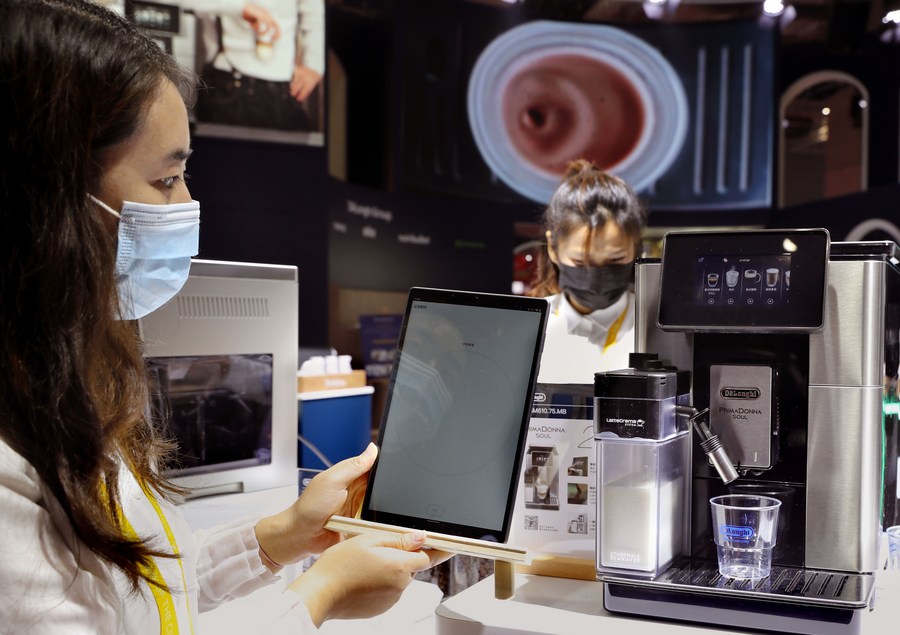
An exhibitor shows an intelligent coffee machine at the 4th China International Import Expo (CIIE) in Shanghai, east China, Nov. 5, 2021. (Xinhua/Liu Ying)
SHANGHAI, Nov. 7 (Xinhua) -- In the huge yet crowded exhibition hall at the fourth China International Import Expo (CIIE), nearly everyone passing the national pavilion of Timor Leste is attracted by the fragrance of coffee and a Baymax-looking coffee-making robot swiftly moving its metallic arms.
"Timor Leste has the best Kopi Luwak of the world, and it should be matched with the best coffee-making techniques," said Bei Lei, the pavilion's executive curator. It takes the robot around three minutes to brew a cup of coffee, with the whole process remotely controllable.
The coffee industry is regarded as an economic pillar for Timor Leste, a country with a land area of some 14,800 square km and a population of 1.3 million. Ultra-high standards for bean-picking and processing have made the organic Kopi Luwak a signal product of the country, with annual production limited to about 800 kg.
Timor Leste has been an active participant in the CIIE since 2018. Over the past four years, the event has helped raise the profile of its Kopi Luwak in China, where a growing share of its 1.4 billion people are becoming coffee lovers. Since last year's Expo, Kopi Luwak, as well as other types of specialty coffee from Timor Leste, won orders worth 5 million U.S. dollars.
According to Bei, Chinese buyers have "substantially improved the lives of farmers in Timor Leste." The country's farming industry was heavily impacted by COVID-19 and a devastating flood in April. It was the orders from China that offered more coffee-related job opportunities to farmers.
To express their gratitude, local farmers spent months weaving 100 pieces of Tais cloth, a traditional textile with a symbolic meaning of respect, to present to "the distinguished Chinese customers" at the fourth CIIE, said Bei.
The busy coffee-making robot at the pavilion wears the colorful Tais on its shoulders. Developed by the Beijing OrionStar Technology Co., Ltd, the robot is capable of bringing out the best flavor of the coffee, while ensuring that every cup tastes the same, said Yang Xinbo, a senior product manager at the company.
Yang said the CIIE also provides his company with a great platform for display and cooperation, as the robot and the high-quality Kopi Luwak bring out the best of each other. "We are planning to establish long-term business ties and sell the combination to staff canteens and self-service cafes," he added.
China has been encouraging and assisting the least developed countries to join the CIIE, the world's first national-level dedicated import expo. The exhibiting area of Timor Leste has been expanded from a lonely shelf to two standard booths spanning a total of 18 square meters and is free of site fees.
This is a preferential policy that applies to all national pavilions of the least developed countries. According to the CIIE Bureau, 90 companies from 33 such countries are participating in this year's Expo, enriching the varieties of exhibits as well as the vibe of cultural diversity.
Apart from the annual six-day event, Timor Leste also enjoys the year-round spillover effect of the CIIE. The country has set up two pavilions inside the pilot free trade zone in Shanghai and in the city of Hangzhou, allowing for wider and deeper cooperation between the two countries.
Bei said that the CIIE has become well-known among the people of Timor Leste. "They have truly felt China's openness and its role as a big country through the grand event, and now people look forward to it every year," she added.




 A single purchase
A single purchase









